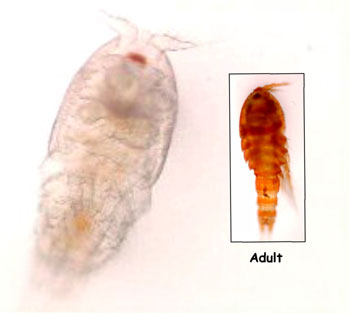| 2003 |

|
YEAR BOOK |
Galway-Mayo Institute of Technology
|
The potential of baby milk as a food for copepods
|

In several experiments, survival on formulated baby milk was significantly (P<0.05) higher compared with an algae mix of Chaetoceros calcitrons, T-Isochrysis galbana and Tetraselmis suecica. Numbers of nauplii (juvenile stage) changing into copepodite stage (pre-adult stage) were also repeatedly higher for the baby milk. A loss of colour of the nauplii and copepodites grown on the milk was observed, compared with wild caught nauplii and copepodites, which have a striking red appearance.
In cultivation of live food, the production of algae is an added expense and effectively you are culturing a live feed to produce a live feed to give as a food item to the larval fish. It would therefore be an advantage to only have a single species of algae, or to replace the algae altogether with formulated feed. Baby milk costs approximately �0.015/g, while algae costs approximately GB�0.49/g for small scale or GB�0.242/g for large-scale production (Ottoway B, pers. comm.; Grubb, J. 1996). Baby milk would be an ideal solution to growing copepods as it is always made up to a uniform standard, could be bought in bulk and stored easily.
This initial investigation into survival and development of Tigriopus brevicornis showed that baby milk is a potential diet for culture of copepods. Further investigations are planned to see if survival and fecundity rates are maintained throughout several generations. The loss of pigment will have to be addressed, as this may reduce the visual appeal of the copepods when feeding to larval fish.
References
Grubb, J. (1996): Microalgae Production Systems. MSc Thesis, University of Aberdeen.
Miles, D., Auchterlonie, N., Cutts, C, & Mazorra, C. (2001): Rearing of the Harpacticoid Copepod Tisbe holothuriae and its Application for the Hatchery Production of Atlantic Halibut Hippoglossus hippoglossus . Unpublished Link Report FIN 23.
Contact: Marianne Green, Martin Ryan Marine Laboratory, Carna; E-mail: [email protected] ;
David McGrath, Department of Life Sciences, GMIT; Tel: 091 753161